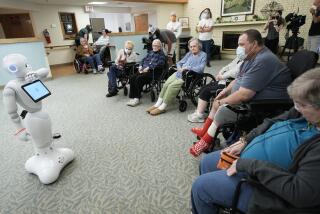Letters: Doctors and nurses -- who will take care of us?
Re “Can’t a nurse do that?,” Editorial, April 21
To combat the impending physician shortage all across California, and the crisis already facing rural areas, state law absolutely must change to allow greater independence for non-physician medical professionals such as nurse practitioners. Merely increasing the number of medical students will not provide more physicians fast enough to handle the influx of new patients when much of the president’s healthcare reform law fully kicks in next year.
The need is as great in the inner city as in rural areas. At T.H.E. Clinic in South Los Angeles, we’ve had a 50% increase in patients over the last five years. In preparing for another 25% jump in 2014, we are expanding our locations. But building a bigger staff is more difficult.
We must utilize every medical professional to his or her maximum ability to free up physicians to care for the patients who need them most.
Risë K. Phillips
Los Angeles
The writer is president and chief executive of T.H.E. Clinic.
The Times’ editorial asks the wrong question. Yes, there are important roles for nurse practitioners, pharmacists and optometrists, and especially as the Affordable Care Act expands access to the healthcare system. But the right question to ask is how these medical professionals will serve this growing population.
Our current model, in which these professionals are supervised by physicians, works. It ensures patient safety and quality of care. California needs to expand the ranks of doctors, not the scope of practice of lesser-trained professionals.
AB 1176, introduced by Assemblyman Raul Bocanegra (D-Los Angeles), would expand medical residency programs, as other states have done. Expanding access to medical care is critical, but we need to ensure that high-quality care is maintained.
Samuel Fink, MD
Los Angeles
The writer is president of the Los Angeles County Medical Assn.
Your editorial presents the most obvious solution to the physician shortage: to empower nurse practitioners and other qualified medical professionals through the expansion of their scope of practice.
But this must be done carefully. Doctors usually have eight years of school under their belts, not including the hospital training they receive after graduation. This isn’t the case for nurse practitioners, so it’s understandable that doctors are reticent to yield some of their “turf” to other providers.
However, studies have shown that nurse practitioners are well skilled at managing chronic illness. So why not let nurse practitioners and other qualified medical professionals pick up the slack in this area of care?
This is fine so long as patients have a choice and know that they are being cared for by a non-physician.
Geneviève M. Clavreul
Pasadena
The writer is a registered nurse.
Before California opens the floodgates of medical practice to nurse practitioners, pharmacists and optometrists, I suggest we ask the following question: Why are new doctors not going into family practice and internal medicine?
My guess: Word must be out that they will be overworked, underpaid, underappreciated and soon replaced by less-expensive, less-trained non-physicians.
V.J. Carollo, MD
Upland
ALSO:
Letters: LAPD-made millionaires
Letters: An accused bomber’s rights
Letters: Knives, planes and common sense
More to Read
A cure for the common opinion
Get thought-provoking perspectives with our weekly newsletter.
You may occasionally receive promotional content from the Los Angeles Times.










